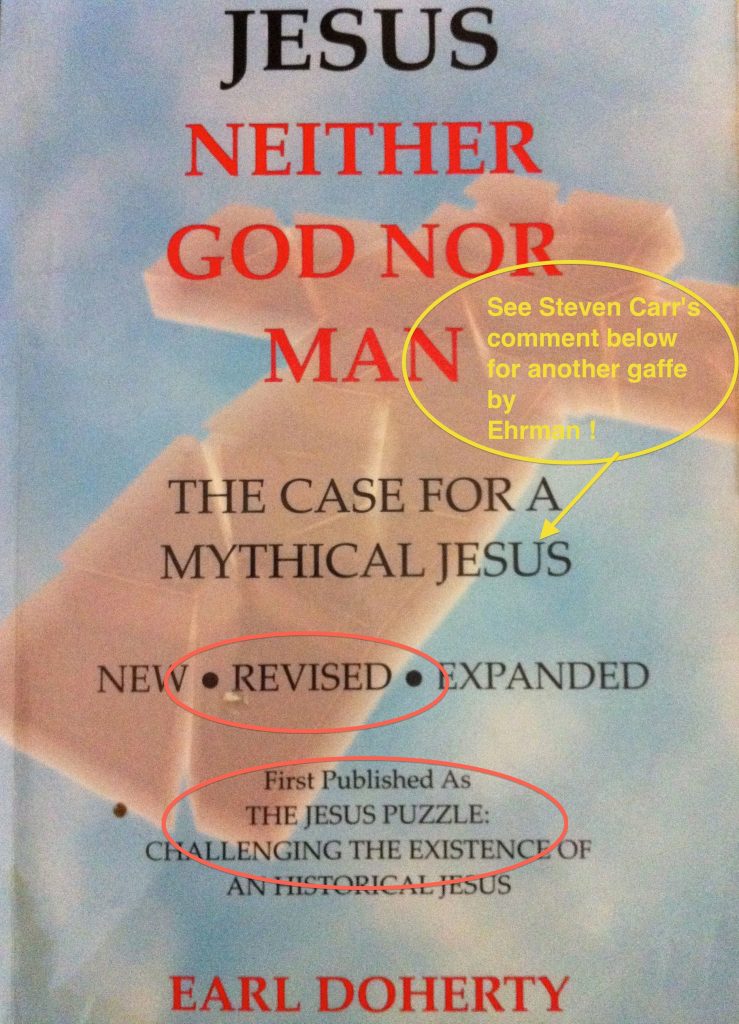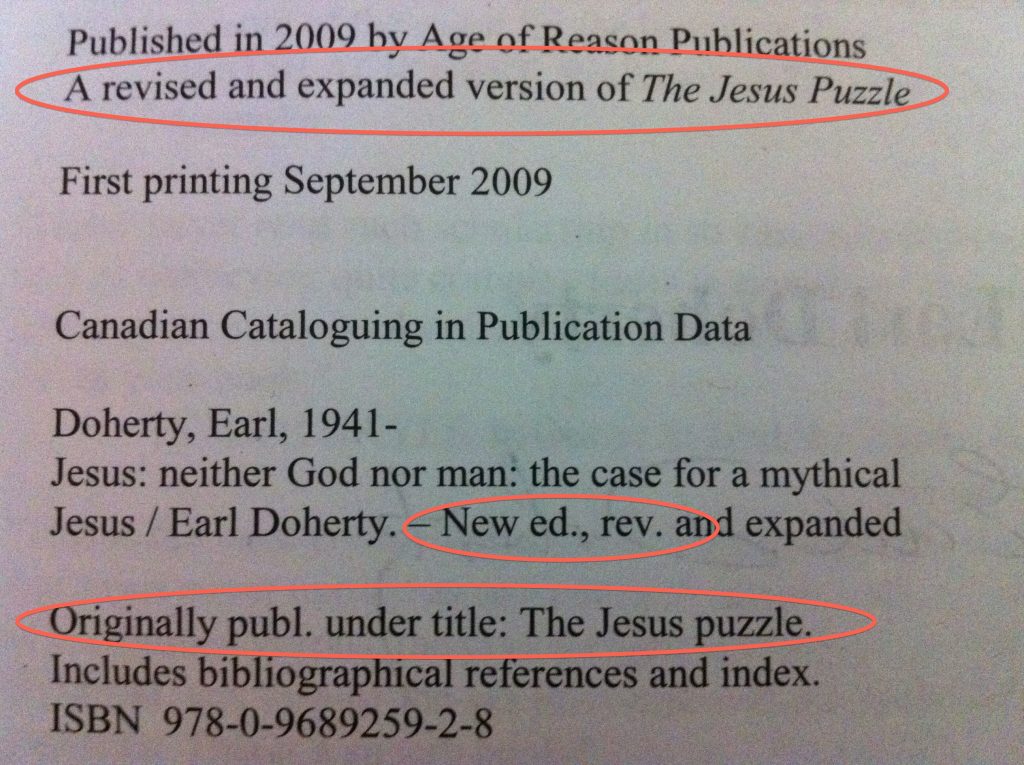 In my previous posts on Bart Ehrman’s assertions about the argument of Earl Doherty’s Jesus: Neither God Nor Man, I think I have uncovered enough evidence to demonstrate that Ehrman at best only very patchily skimmed a few pages of the book. Was he perhaps merely attempting to grasp directions from some of Doherty’s critics rather than reading the book for himself? He has made a complete fool of himself, or worse, by building a recurring criticism upon a blatant misquotation from the book and accusing Doherty of arguing the very opposite of what he in fact writes.
In my previous posts on Bart Ehrman’s assertions about the argument of Earl Doherty’s Jesus: Neither God Nor Man, I think I have uncovered enough evidence to demonstrate that Ehrman at best only very patchily skimmed a few pages of the book. Was he perhaps merely attempting to grasp directions from some of Doherty’s critics rather than reading the book for himself? He has made a complete fool of himself, or worse, by building a recurring criticism upon a blatant misquotation from the book and accusing Doherty of arguing the very opposite of what he in fact writes.
I return here to Ehrman’s opening words about Doherty’s book. It looks like Ehrman never even bothered to read its cover!
He writes:
[Doherty’s] now-classic statement is The Jesus Puzzle: Did Christianity Begin with a Mythical Christ? This has recently been expanded in a second edition, published not as a revision (which it is) but rather as its own book, Jesus: Neither God nor Man: The Case for a Mythical Christ.
This is only a tiny thing, but it is a curiosity.
The cover of Jesus: Neither God Nor Man twice says it IS indeed published as a revision of The Jesus Puzzle.
The front cover says:
NEW – REVISED – EXPANDED
and on the same cover beneath those words we read:
First Published As THE JESUS PUZZLE
Turn now to the verso of the title page where one normally reads the publication data:
A revised and expanded version of The Jesus Puzzle
The cataloguing in publication information says the book is published as a
New edition, Revised and Expanded, of The Jesus Puzzle.
It tells us a third time:
Originally publ. under the title: The Jesus puzzle.
So why does our good doctor and reviewer say of the book that it was not published as a revision of The Jesus Puzzle even though the cover and title page verso inform us five times that it is such a revision?
Why did he even think to make such a point that is clearly wrong?
Is Ehrman tyring to make some suggestion that Doherty has not been strictly above board about the nature of this publication?
I don’t know. But it’s a strange little detail.
For those interested here is what Doherty himself says about this new book and why he published it as a revision of his first:
The original The Jesus Puzzle book has had a substantial impact, and is generally regarded as the leading and most persuasive publication in recent years in support of the mythical Jesus theory. It is regularly being cited, supported and attacked. This impact has been achieved in conjunction with The Jesus Puzzle website which predated the book by a few years. The primary purpose of both site and book was to reach the open-minded ‘lay’ audience and only secondarily to invite consideration or challenge by established academia— something that has so far not been offered. With this new and expanded edition of my work, I hope to appeal to an audience in both mainstream academia and the general public. Partly because I intend to keep the original book in circulation as a simpler version of the case, I have given this expanded offering a new title. . . .
If you enjoyed this post, please consider donating to Vridar. Thanks!


‘This has recently been expanded in a second edition, published not as a revision (which it is) but rather as its own book, Jesus: Neither God nor Man: The Case for a Mythical Christ.’
Did Ehrman get the very name of the book wrong?
Or is it just me?
Normally Ehrman gets the name of a book he has read right.
I have also highlighted this in the cover image.
It’s a greatest hits for Ehrman, he’s misquoting, corrupting texts and forging them … all in one!
I knew it. Bart Ehrman wrote the Bible.
A Jesus here, a Christ there, what’s the diff? (eye roll)
In the abstract no difference at all. But if you follow the thread of these posts you will see we are talking here about a highly respected academic whose views on this particular book many have been eagerly anticipating, and who has been shown from the most fundamental level of content to the most superficial level of simply reading the cover to have been culpably negligent and careless to the core in his treatment of it.
I was agreeing sarcastically. Ehrman is a tough one to engage. He’s very slippery. I know from personal experience. (another eye roll)
Ehrman gets the name right in the bibliography.
It is always nice to find something positive to say about a new book.
Speaking of bibliography, one book Ehrman did not include is Jesus Outside the New Testament: An Introduction to the Ancient Evidence (Studying the Historical Jesus) by Robert Van Voorst. Just after minute 50 of this presentation, Richard Carrier has some nice things to say about this book even though he didn’t agree with the author that it supported the existence of a historical Jesus. Richard says that Van Voorst very honestly presents the evidence, and if it isn’t in that book, it doesn’t exist. Therefore, one can only wonder why Ehrman wouldn’t have referred to the Van Voorst book. Not having read the book, my suspicion would be that it is because Van Voorst doesn’t present any evidence that supports Ehrman’s pet theory of Jesus as an apocalyptic Jewish prophet.
Or maybe it’s because he noticed in my book that I took Robert Van Voorst apart (as I did in my website article “Alleged Refutations of Jesus Mythicism“). While VV may have presented all the evidence, he was guilty of distorting much of its interpretation, and the conclusions he managed to draw from them were often in contradiction with the evidence itself which he had just presented. (All, of course, in favor of an historical Jesus.)
All the more support for the contention that Ehrman had no interest in forthrightly laying out all of the evidence for readers of DJE but rather was primarily interested in promoting his pet concept of Jesus as an apocalyptic Jewish prophet.
I don’t know how many of you may have caught this, but I’ll share something I just posted on FRDB….
I watched the latest episode of “Bones” tonight. Those of you who have read the Preface to Jesus: Neither God Nor Man will remember that I remarked on a 2007 episode of “Bones” in which a couple of characters voiced the possibility that Jesus did not exist. Well, in tonight’s episode, the title character Temperance Brennan, noted for her ultra-rational skepticism, pooh-poohed the “mythology” of the Christian religion (in a nice way, of course), in opposition to FBI agent Seeley Booth’s traditional Catholic faith (her partner now–not sure if they’ve married). A subplot in the episode had her–9 months pregnant–giving birth. Despite an ongoing argument between them over where was the best and safest place to give birth–either in a hospital or in the home–when the moment came they were on the highway, returning from investigating their latest crime case. Desperate, they stopped at an “inn” which was packed with visitors to a wine-tasting convention, and–you guessed it–there was no room to spare where the birth could take place, so they were shunted to a kind of stable behind the inn (a couple of horses, though no oxen, and no shepherds in sight) where Brennan gave natural birth with Booth’s help while the horses looked on.
An enthused Booth was struck by the parallel and was convinced it symbolized and legitimized the event of Jesus’ own birth. A more level-headed Brennan quipped: “It doesn’t make your mythology true!”
We’re getting there, when mainstream prime-time TV shows can call the Christian myth what it is and even call Jesus’ existence into question. Why don’t you and Ehrman take a ride on the wave of the future, Abe, rather than blindly imbedding yourselves in the crumbling concrete of the past?
Ken Humphreys has just torn into Bart Ehrman’s William Lane Craig impersonations.
http://www.freeratio.org/showthread.php?t=313610
Im going to say it first and here, Ehrman didn’t write but has simply borrowed his name to help sell –Did Jesus Exist–.